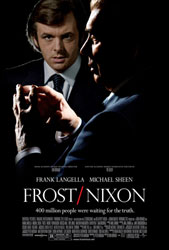 While it doesn’t open in wide release until Friday, I had a chance to see “Frost/Nixon” out in Los Angeles last week and I can’t recommend it enough–for adults who remember the time but who can now reflect on history much more intelligently and for young people who are bored by history.
While it doesn’t open in wide release until Friday, I had a chance to see “Frost/Nixon” out in Los Angeles last week and I can’t recommend it enough–for adults who remember the time but who can now reflect on history much more intelligently and for young people who are bored by history.
“Frost/Nixon” presents a dynamic chapter in the life of President Richard M. Nixon, a former United States Senator, Vice-President, and President who’d historically participated in the first televised presidential debate, broke down the walls to visit China, and who’d then been disgraced and forced to resign from office. Three silent years later, seeking to rebuild his legacy, he selected a British television personality, whom he believed he could outwit, to send his personal propaganda message to the people of the world. It ended up being presented as a series of TV interviews in England as well as the U.S. in a time when everyone here watched one of the three major networks
Peter Morgan’s script and Ronnie Howard’s (you can call him Ronnie if you graduated from the same high school) directing create an urgency and tightness to a drama that’s rarely seen (or even presented) in this age of Michael Bay violence, Terminator-ish hyper-fast editing and star-studded soundtracks. (Mr. Howard is also the cover boy in a nice USA Today article.)
Even though I’ve seen Frank Langella, who plays Nixon, in other political movies (namely as the bad guy in “Dave”), the veil between actor and character disappears relatively early into the movie. It was evident to me why he won a Tony for this role on Broadway. And I never watched the original interviews but Michael Sheen certainly reprises any recollections I have of David Frost. There’s also an important (if brief) view into how the personalities of both of these’s men’s advisors affected their politics and on screen personas.
What’s inspiring about this movie for me is Mr. Howard’s ability to present a dramatic story even when we already know the ending. He did the same thing in “Apollo 13,” and I remembered the feeling of watching a different kind of drama, where the tension lies in how the characters interact rather than in what the ending will be. This kind of film forces us to be reflective, and make decisions about what we ourselves think. That kind of personal responsibility is something few directors still ask of us.
As for this film’s impact on President Nixon’s legacy, it will probably linger in history longer and with more stickiness than its predecessors “Nixon” (by Oliver Stone) and “All the President’s Men” (with Dustin Hoffman and Robert Redford). Stone’s “Nixon” was more of a docudrama, while “‘Men” was more about the reporters’ trail than Nixon himself. But Langella is bigger than life in “Frost/Nixon,” presenting a version of the former President that is attractive but in no way saintly, redemptive but flawed. You really get the idea Nixon meant well, and yet at the same time you get the idea that he had no balanced construct for evaluating the appropriateness of his actions or, for that matter, the law.
President Nixon died in New York in 1994 at age 81. And yet, 14 years, later the campaign he began with these interviews still continues.



